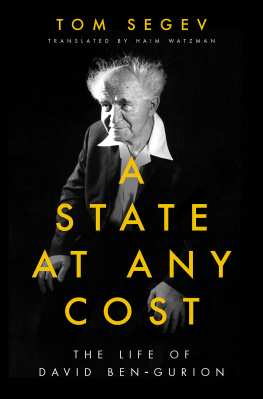A
S T A T E
A T A N Y
C O S T
1949: The First Israelis
Soldiers of Evil: The Commandants of the Nazi Concentration Camps
The Seventh Million: The Israelis and the Holocaust
One Palestine, Complete: Jews and Arabs Under the British Mandate
Elvis in Jerusalem: Post-Zionism and the Americanization of Israel
1967: Israel, the War, and the Year That Transformed the Middle East
Simon Wiesenthal: The Life and Legends
A
S T A T E
A T A N Y
C O S T
T H E L I F E O F
D A V I D B E N - G U R I O N
T O M S E G E V
T R A N S L A T E D B Y H A I M W A T Z M A N
AN APOLLO BOOK
www.headofzeus.com
Originally published in Hebrew in 2018 by Keter Books, Israel.
English translation published in the United States by Farrar, Straus and Giroux.
First published in the UK in 2019 by Apollo, an imprint of Head of Zeus Ltd.
Copyright 2019 by Tom Segev
Translation copyright 2019 by Haim Watzman
The moral right of Tom Segev to be identified as the author of this work has been asserted in accordance with the Copyright, Designs and Patents Act of 1988.
Grateful acknowledgment is made for permission to reprint the following material:
Cartoon on : Illustration by the cartoonist Yosef Bass, courtesy of the heirs of his estate: Yona Spiegelman, Yael Chen, Rafael Bass.
Cartoon on : Illustration by the cartoonist Dosh (Kariel Gardosh), originally published in Maariv, November 13, 1964, courtesy of the Gardosh family.
All rights reserved. No part of this publication may be reproduced, stored in a retrieval system, or transmitted in any form or by any means, electronic, mechanical, photocopying, recording, or otherwise, without the prior permission of both the copyright owner and the above publisher of this book.
A catalogue record for this book is available from the British Library.
ISBN (HB): 9781789544626
ISBN (E): 9781789544640
Jacket design: Na Kim
Jacket photograph: Ricarda Schwerin and Alfred Bernheim (1963), courtesy The Israel Museum
Author photograph: Dan Porges
Head of Zeus Ltd
First Floor East
58 Hardwick Street
London EC1R 4RG
WWW.HEADOFZEUS.COM
For my grandchildren, Liya, Ben, Lior, and Amit
And their parents, Shira and Itay
CONTENTS
INTRODUCTION:
IN THE FOOTSTEPS
OF HISTORY
On a cold January day in 1940, David Ben-Gurion rode down to the Kalia Hotel by the Dead Sea, where, at the lowest land point on the globe, he devoted some thought to the way he would appear in the book that some future biographer would eventually write about him and his colleagues, founders of the State of Israel. He imagined a young, intelligent, and good biographer. Obviously, that biographer would discern the founders weaknesses, flaws, and shortcomings: none of them had been ministering angels and seraphs and cherubs, Ben-Gurion wrote. But would he be able also to respect them and grasp the historic significance of their achievements? Would he perhaps even realize how much hed missed by coming to know them only after their deaths? Ben-Gurion was often preoccupied with death.
Like national leaders in other countries, Ben-Gurion worked diligently to shape the historical narrative of his time and of himself. When Israel was ten years old, he imagined an archaeologist excavating the countrys artifacts three thousand years hence. The archaeologist might uncover a chronicle of the War of Independence of 1948 and learn from it about Israels victory. But what if he instead found scraps of newspapers from Egypt, Syria, Jordan, and Iraq, telling of an Arab victory? Who would the archaeologist of the year 4958 believe, Ben-Gurion wondered?
Ben-Gurions diaries, articles, books, letters, and speeches comprise millions of words; he spent many hours writing nearly every day. Sometimes Im amazed by how much I have written, he once remarked.
An avid reader of biographies, he often tried to piece together the motives of their authors. Plutarch apparently did not like Marius, Ben-Gurion wrote regarding one of the books he took with him to Kalia, and did not stint at humiliating and vilifying him, but for all that was unable to obscure his admirable manly character. Gaius Marius was a Roman general and statesman who could have aroused Ben-Gurions interests because of the inner contradictions of his character, with its frequent and sudden upswings and downturns.
On a few occasions he cooperated with biographers who acclaimed him as the founder of Israel. But there were others as well. At the beginning of 1967, a controversy broke out over the entry devoted to him in the Hebrew Encyclopedia . The author was the works editor in chief, Yeshayahu Leibowitz, a professor at the Hebrew University and an old adversary. I think that [Ben-Gurion] is the biggest catastrophe that ever happened to the Jewish people and the State of Israel, Leibowitz told the daily newspaper Maariv ; the entry he wrote took this view. Ben-Gurion put on a show of equanimity. I dont care what Professor Leibowitz wrote, he responded, but I care what I do, whether its good or bad. But, in fact, he was furious. Leibowitz is consumed by hatred, he wrote to the encyclopedias publisher; he was Gaius Marius and Leibowitz Plutarch. He was quite naturally pleased when, a few years later, a sculptor told him about plans to erect a Pantheon in Haifa that would display busts of the great men of the nation: statesmen, writers, artists, military leaders, scientists, athletes, and others. I told him that I liked the idea, Ben-Gurion wrote. But Ill say no more than that.
According to Golda Meir: It was our heartfelt prayer that this man enter history in all his splendor, and it is painful that that is not coming to pass. Sad for him and sad for us. Biographers of Ben-Gurion find themselves confronted with a huge amount of archival material that can affect their evaluation of the man, for good and for bad. As a whole this material demonstrates Ben-Gurions forcefulness, merits, and achievements, but also his limitations, weaknesses, and failures.
Ben-Gurion was a man who did not change, said one of his acquaintances. From the start, he exhibited ideological devotion and awed those around him. He believed that to the end of his life. He saw himself, and was seen by others, as an incarnation of history. His thinking was systematic and methodical, and even when he contradicted himself, the impression was that his pronouncements reflected extended, profound, consistent, unwavering, and considered judgment. He presumed to know what to do in almost every situation.
He very much wanted to be a leader and aspired to everything that leadership offers: the realization of a dream that was for him self-fulfillment, responsibility, power, and a place in history. He frequently evoked the Bible and Jewish destiny, but realized that achieving the dream of a Jewish state required exhausting labor and tiny, often exasperating steps forward. Many shared his vision, but few of his colleagues were as addicted to politics as he was, and from such a young age. Few of them were as diligent as he, or as able to grasp details. These characteristics made him an indispensable leader, although not an omnipotent one.
The drama of his life included threatening Jewish capitalists in his Polish hometown with a pistol, spending hours in the basement of a bookstore in Oxford, herding sheep in the desert, imbibing the scent of power in the White House, and waiting for Lenin to appear in Moscows Red Square. He engaged in politics, made fateful decisions, sent people into war, stood over the bodies of fallen paratroopers, was captivated by the magic of Niagara Falls, and sought peace under the oldest oak tree in Palestine. He wrote fine accounts of all these episodes, often revealing a poetic emotionalism that few associate with him.






